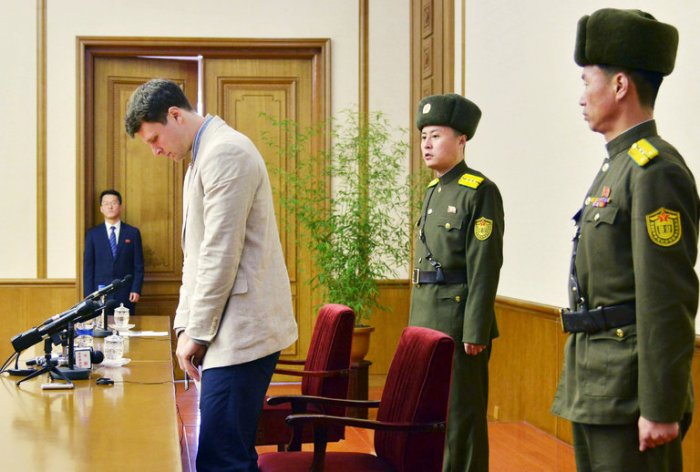
Otto F. Warmbier on Monday apologized on North Korean state television in Pyongyang. CreditKyodo, via Reuters
A New York Times article was recently published with the headline, “Parents of American Held in North Korea Unable to Speak with Him“. This headline, and any with the words North Korea will cause much speculation. The article said, “‘The statement urged the North Korean government to ‘consider his youth and make an important humanitarian gesture by allowing him to return to his loved ones’” (New York Times, 2016). That statement caused some concern regarding torture. The college undergrad, age 21, apparently stole a political banner. In a North Korean television appearance showed him in a tie and suit, with no harm done. This college student has committed a crime but how should the North Korean government go about executing his punishment? It seems a bit harsh to keep him in government hands, even with his public apology.
I believe there is a bigger problem here: how does the role of torture play between countries who have no agreements with each other? This question arises because this problem has occurred in the past. The U.S. had instances where people would skip bail and fly to another country that the U.S. doesn’t have a treaty with. They basically get out of jail free. Another problem is that different countries have different penalties for different levels of crimes. What may be trivial for one country may not be taken so lightly for another, in this case the U.S. and North Korea. The question above provokes debates and opinions on how to best handle these situations.
On one hand North Korean Officials can keep him there to execute a punishment, which they are free to do since the U.S. has no agreement with them regarding criminals. On the other hand, North Korea can send the student back to the U.S. for his punishment. North Korea is a sensitive topic, even for the United Nations. Since the undergrad committed a crime on North Korean soil, the U.S. can’t do anything except plead on behalf of him. A student’s simple trip abroad has caused the Obama Administration, CIA, and countless other agencies to be involved.
Per my last blog, I talked about water boarding. If the U.S. can waterboard criminals, then I feel like the same should be applied to American citizens who commit a crime in another country. I am not saying that North Korea should punish that student. I am saying that if they wanted to punish him, they have the right to do so.
While I was researching about the topic of torture, which is what we were talking bout in class, I stumbled upon this article from the New York Times. This article talks about the U.S. owning up to torture. I think it was interesting because the U.S. thinks of itself as a big brother so if they don’t own up to their own actions, how can other countries trust them?
